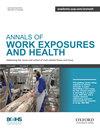89 促进可持续发展目标 8:体面工作和第五项基本权利--安全的工作场所
IF 1.8
4区 医学
Q3 PUBLIC, ENVIRONMENTAL & OCCUPATIONAL HEALTH
引用次数: 0
摘要
可持续发展目标(SDGs)是一项雄心勃勃的全球议程,旨在到 2030 年应对多方面的挑战。可持续发展目标 8 重点强调促进体面工作和经济增长。其核心是承认工人的第五项基本权利:安全和健康的工作环境。本介绍强调了在可持续发展目标 8 框架内承认工作场所安全与健康是一项基本权利的深远意义。它强调,这项权利不仅是一项道德义务,也是实现更广泛的可持续发展目标的重要催化剂。首先,安全和健康的工作环境与工人的福祉息息相关,与可持续发展目标 3(良好的健康和福祉)的原则密切相关。通过减少职业危害和职业病,它直接有助于改善身心健康,提高工人的生产率和生活质量。其次,安全健康的工作环境是经济增长的关键,与可持续发展目标 8 的目标密切相关。体面的工作环境可以减少缺勤、降低医疗成本、提高幸福感、工作满意度和安全文化,并支持工人的整体健康,这将创造更强大的劳动力,促进经济稳定。总之,承认第五项基本权利--安全的工作场所,对于推进可持续发展目标至关重要。从改善个人福祉和经济增长,到促进负责任的消费和生产,它能推动多个方面的进步。政策制定者、企业和公民社会之间的合作对于维护这项权利,实现更加公平、可持续的未来至关重要。本文章由计算机程序翻译,如有差异,请以英文原文为准。
89 Promoting SDG 8: decent work and the 5th fundamental right – A safe workplace
The Sustainable Development Goals (SDGs) represent an ambitious global agenda, aiming to address multifaceted challenges by 2030. SDG 8 places a crucial emphasis on promoting Decent Work and Economic Growth. At its core lies the recognition of the 5th fundamental right of workers: a safe and healthy working environment. This presentation highlights the profound significance of acknowledging workplace safety and health as a fundamental right within the framework of SDG 8. It underscores that this right is not just an ethical imperative but an essential catalyst for achieving broader sustainable development goals. Firstly, a safe and healthy working environment is intrinsic to the well-being of workers, aligning closely with the principles of SDG 3 (Good Health and Well-being). By reducing occupational hazards and illnesses, it directly contributes to improved physical and mental health, enhancing workers’ productivity and quality of life. Secondly, a safe and healthy working environment is a linchpin for economic growth, closely aligned with the objectives of SDG 8. Decent working environments reduces absenteeism, cost of health care, enhance well-being, job satisfaction, safety-culture, and support overall health of workers which will create a more robust labour force, promoting economic stability. In conclusion, recognizing the 5th fundamental right, a safe workplace, is crucial for advancing the SDGs. It catalyses progress across multiple dimensions, from improving individual well-being and economic growth to promoting responsible consumption and production. Collaboration among policymakers, businesses, and civil society is essential to uphold this right for a more equitable, sustainable future.
求助全文
通过发布文献求助,成功后即可免费获取论文全文。
去求助
来源期刊

Annals Of Work Exposures and Health
Medicine-Public Health, Environmental and Occupational Health
CiteScore
4.60
自引率
19.20%
发文量
79
期刊介绍:
About the Journal
Annals of Work Exposures and Health is dedicated to presenting advances in exposure science supporting the recognition, quantification, and control of exposures at work, and epidemiological studies on their effects on human health and well-being. A key question we apply to submission is, "Is this paper going to help readers better understand, quantify, and control conditions at work that adversely or positively affect health and well-being?"
We are interested in high quality scientific research addressing:
the quantification of work exposures, including chemical, biological, physical, biomechanical, and psychosocial, and the elements of work organization giving rise to such exposures;
the relationship between these exposures and the acute and chronic health consequences for those exposed and their families and communities;
populations at special risk of work-related exposures including women, under-represented minorities, immigrants, and other vulnerable groups such as temporary, contingent and informal sector workers;
the effectiveness of interventions addressing exposure and risk including production technologies, work process engineering, and personal protective systems;
policies and management approaches to reduce risk and improve health and well-being among workers, their families or communities;
methodologies and mechanisms that underlie the quantification and/or control of exposure and risk.
There is heavy pressure on space in the journal, and the above interests mean that we do not usually publish papers that simply report local conditions without generalizable results. We are also unlikely to publish reports on human health and well-being without information on the work exposure characteristics giving rise to the effects. We particularly welcome contributions from scientists based in, or addressing conditions in, developing economies that fall within the above scope.
 求助内容:
求助内容: 应助结果提醒方式:
应助结果提醒方式:


